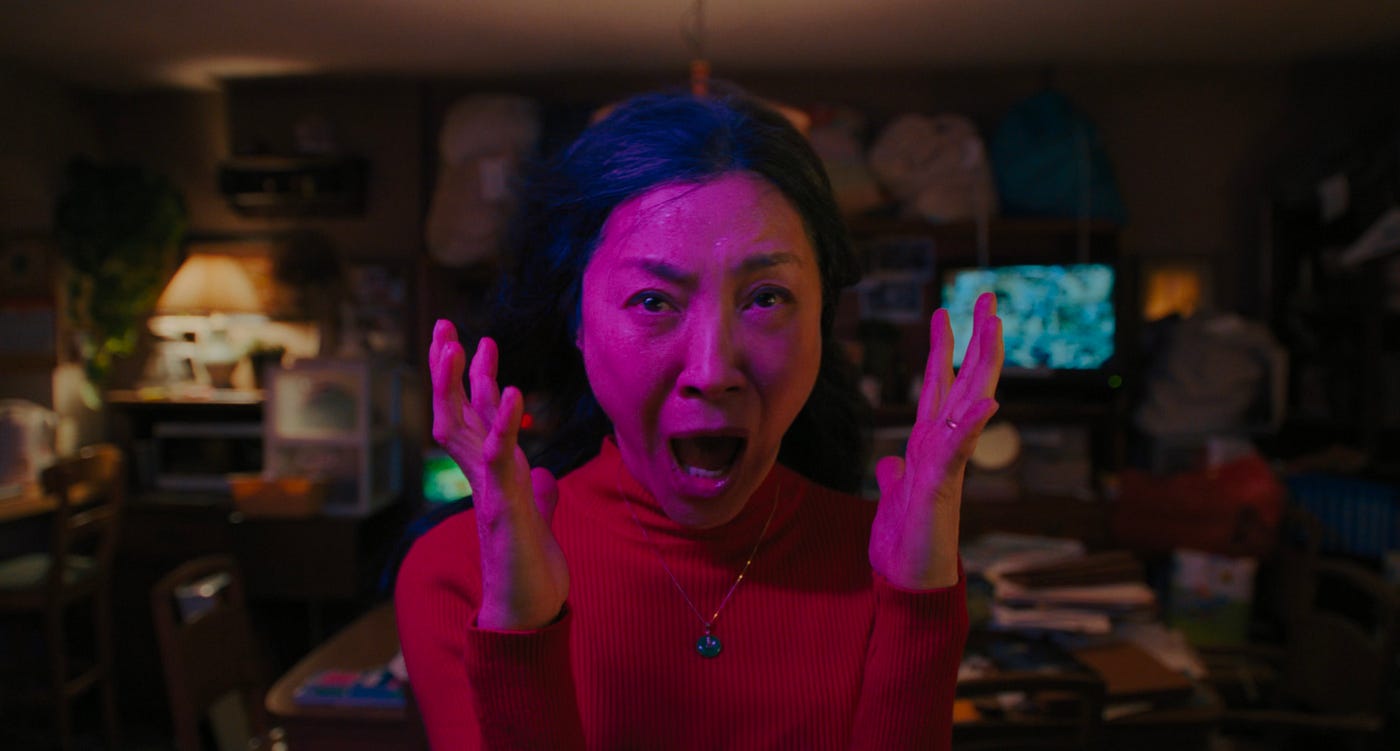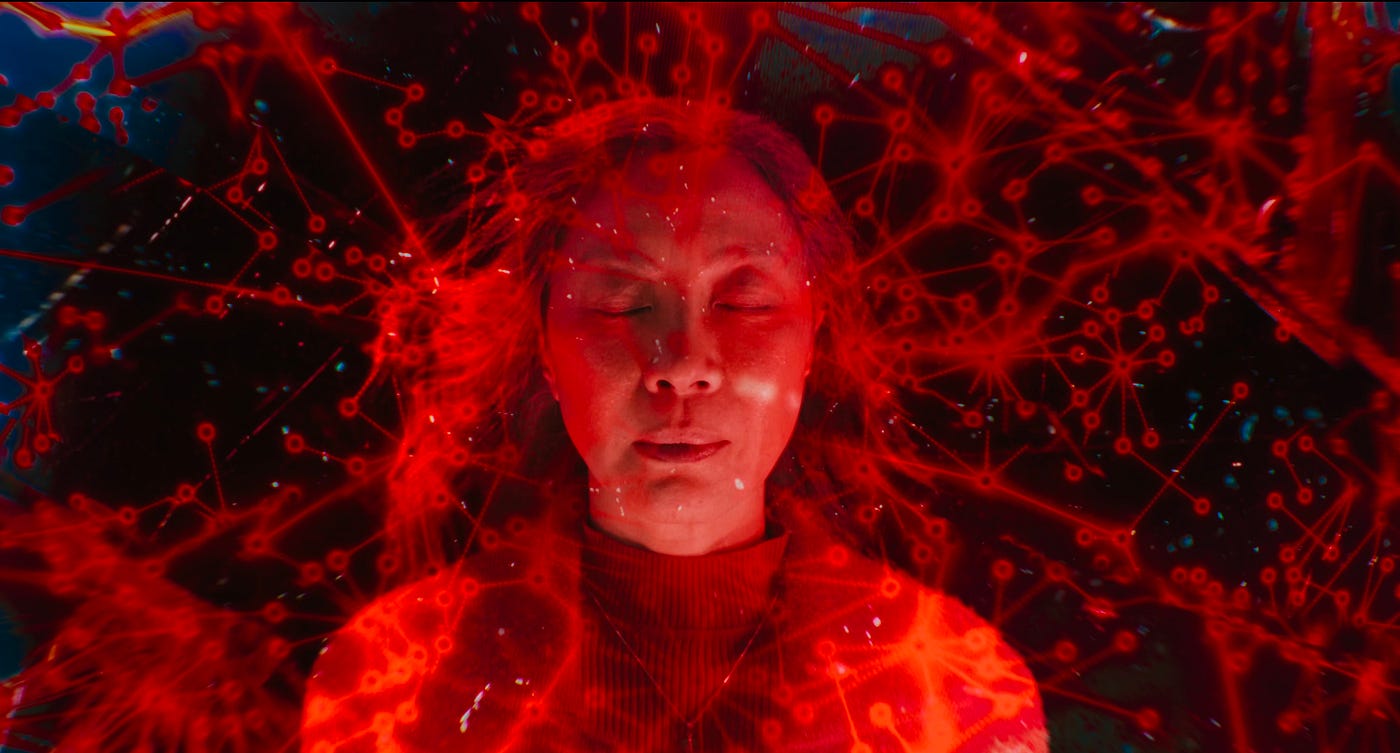How Films Are Like Psychotic Episodes

I was watching Everything Everywhere All at Once and it felt uncomfortably close to home. Not the part of about multiverses and strange rituals and conspiracies, but the part about believing in them. It felt like watching a psychotic episode.

I haven’t had a psychotic ‘break’ (essentially a day-trip into schizophrenia) but I have seen a few up close. I’ve seen someone truly believe they were at the center of a grand conspiracy that we had to go to some parking lot to sort out. There were messages and signs everywhere, I just wasn’t catching on. So many movies start this way, but this was real life.
The difference in movies is that the audience is in on the delusion, and it’s fun. Thinking there’s a treasure map on the back of the Declaration of Independence, imagining that the whole world is a computer program, lots of movies are psychotic breaks we safely experience in the cinema. If you start imagining these things outside the theatre, however, that’s just schizophrenia.

In Everything Everywhere there’s a telling scene where Mrs. Wang (Michelle Yeoh) holds a script telling her the obscure rituals she needs to perform to access the multiverse. I’ve seen someone perform similar rituals in real life, only it doesn’t work. The truth is that ‘real’ life is full of rituals like this (stand this way in line, take out this plastic card, push these magic numbers). In a psychotic episode these lines get crossed, but the premise itself is not absurd.
What so many movies do is take psychotic episodes to their logical conclusion. What if there really is a conspiracy, and you’re the only one that can stop it? What if everyone really is out to get you? What if the signs are all hiding there in plain sight, waiting for you to put them together? A cinematic break is thus a psychotic break writ large. TV episodes are psychotic episodes, and every novel is a pocket delusion.
In this sense mental health is a bit of a misnomer. It’s not about having or not having delusions, it’s about having the right delusions. If enough people have a delusion it becomes social reality. Take for example, everything. Money, marriage, nations, words, math. We imbue meaningless things with meaning and because we all agree on it, it’s true. But not true in an especially ‘objective’ sense, it’s more like a shared hallucinations.
Hallucinations have something to do with reality (hence planes fly based on math) but they’re still a representation of reality (which is why they crash too). There are different degrees of delusion, from the 100% useless to the 99% useful, but they’re all a degree of separation from ‘reality’, which is infinite and simply cannot be fit in a human skull.
Hence madness is not about having an ‘unhealthy’ brain per se, that too is just a metaphor. We are all mad in socially agreed upon ways and we go into dark rooms and go mad together for fun (movies). Madness is when your delusions get unmoored from everyone else’s and it hurts. Reality is not only different from other people, it’s different from moment to moment, you become estranged even from yourself, whatever that is. The disconnection hurts.

We are ultimately social animals, not individuals. For proof of this just have someone die, and feel how it smarts. If feels like a limb has been cut off. Feelings are not just chemical processes in individual brains, they live in the invisible synapses between each other. Hence pharmaceutical interventions against psychosis really can work for stopping the ‘delusions’ without addressing the hurt.
In movies, on the other hand, people follow the voices in their head and their delusions, usually to self-actualization. The hero does this and that, saves the world or whatever, but it’s usually about reconnecting with a parent, a spouse, a child, a friend, or their community. This is the crux of Everything Everywhere, as it is for most movies of this sort. This is why so many movies about saving the world get reduced to how one person feels about their father.

This is what western medicine misses in its treatment of mental health. I’m thankful for drugs that can stop the delusions, they’re very painful, for everyone. When my loved one was in the mental ward, they told me about the other people there. And those people didn’t have stable homes and ‘healthy’ financial or social situations to go back to. They had drugs but not hugs, and the latter makes all the difference.
The biggest misconception is that mental health (or health in general) is personal, a personal problem to be solved by buying the right products. And it’s just not.
In the cinema we understand this. The whole audience experiences a psychotic episode together and the resolution is some sense of communion, both among the characters on screen and among ourselves. But outside the cinema we remain apart. Madness is madness and reality is reality and the universes must never touch. But this is delusional.

Life is but a dream, and we can really feel it in the shared dreams we call art. But then we step outside and think that we’re awake, when we’re really not. Life is just a billion potential dreams going at once, intersecting in a society that tries to sort them out through ritual. Each of us runs our own unique simulation of the universe, and what we call sanity is just the tenuous balance between them all.
In the film Everything Everywhere All At Once the scale is multi-universal, but ultimately not. A whole bunch of universe jumping happens, and you see it happen, but this is ultimately as irrelevant as an individual psychotic episode. Like so many iterations of the hero’s journey, everything returns to equilibrium, besides the heart of the hero.

In this case Mrs. Wang reconnects to her marriage, her family, her community, and all the delusions that matter. This should tell us what actual mental health patients need, and is in fact how my beloved mental patient got out. In a universe that obviously doesn’t give a fuck, the greatest delusion of all is love. And that’s what we all need more of.